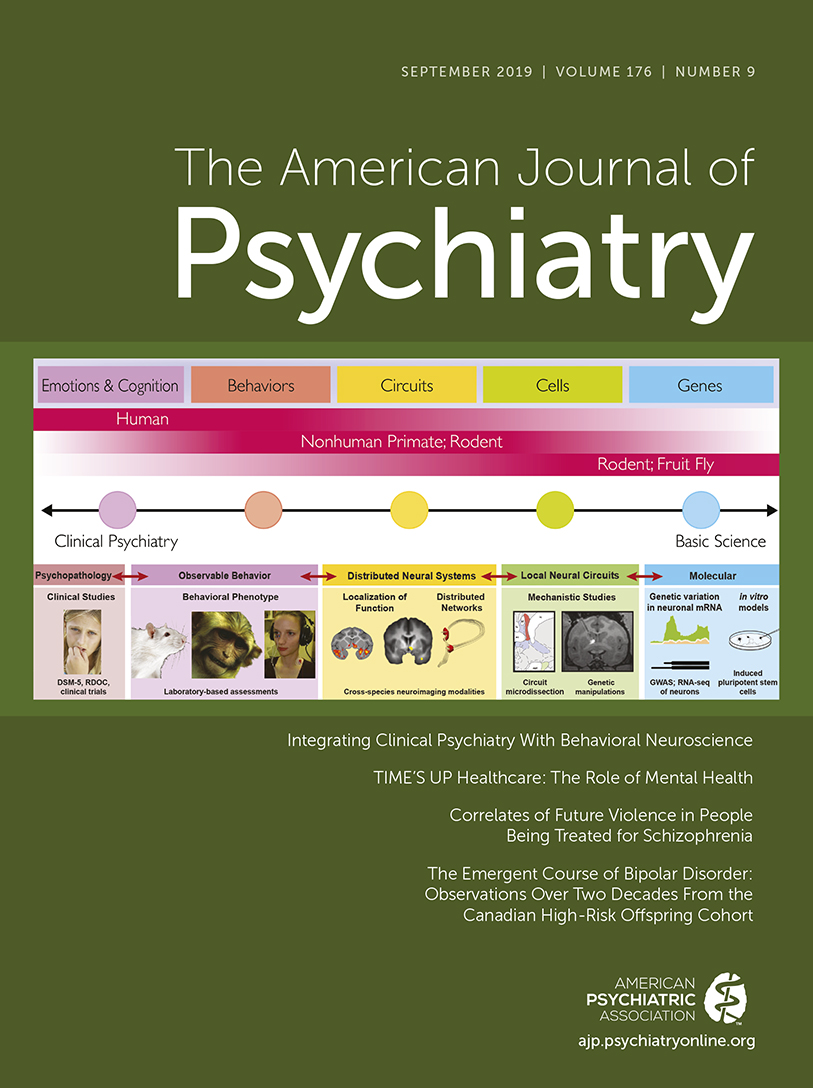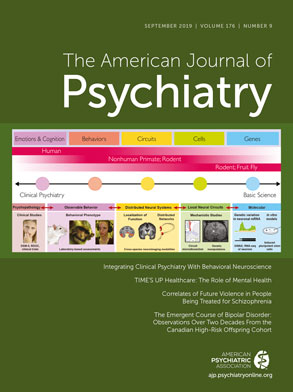Stimulant medications have been used to treat symptoms of attention deficit hyperactivity disorder (ADHD) for over 80 years, longer than the use of antibiotics to treat infection (
1). Based on data from over 6 million individuals in an insurance database, the 2008 annual prevalence for filled stimulant prescriptions was found to be 4.6% for children ages 6–12 years, 3.7% for adolescents (13–18 years), and 1.6% for young adults (19–24 years) (
2). These figures are in line with data from other studies (
3) and are below the estimated 7% 1-year prevalence of childhood ADHD (
4). The short-term efficacy of stimulants in ADHD is well established (
5), yet despite eight decades of clinical use, there continues to be angst over it. Reviews call attention to the fact that there have been no long-term studies of stimulant use beyond 1 year (
6), and this fact is often brought up by the lay media in discussions of the treatment of ADHD (
7).
Previously, the Multimodality Treatment of ADHD study (MTA) found that after 14 months, structured medication management was superior to behavioral treatment alone or treatment as usual in the community (
8). After the first year, all participants in the MTA sought whatever treatment was available, and as a result, the exposure to medication treatment was highly variable as the years wore on. The most recent follow-up examined medication usage, ADHD outcome, and growth at age 25 (
9). Medication usage was assessed by interviewing the patient or caretakers—always an issue, as patients tend to overreport their adherence to medication regimens. The MTA defined being on “minimal” medication as taking 10 mg of methylphenidate (or its equivalent) per day more than 50% of the time. Based on this definition, the MTA sample was broken down into three groups: negligible (always below the minimum at all time points interviewed), inconsistent (below the minimum in most follow-ups), and consistent (above the minimum at all time points). This latter group consisted of only 35 individuals, or 7.3% of the sample. Not surprisingly, given this very low medication exposure, no relationship was found between ADHD outcome and medication usage.
The MTA could not address the question of the efficacy of stimulant medication use beyond 1 year, so there is a need to reliably establish the long-term benefits of stimulant use in ADHD treatment. There is also the practical clinical question as to how long to maintain a child or adolescent with ADHD on stimulants. A common question that is asked is whether the patient has “grown out of” his or her ADHD, such that the medication can be discontinued. In this issue of the
Journal, Matthijssen et al. (
10) report on the first double-blind placebo-controlled discontinuation study in ADHD patients who were continuously treated with methylphenidate for at least 2 years. The participants had to be on a stable regimen of either 36 mg or 54 mg of extended-release methylphenidate for the past 4 weeks; they then entered a blinded study in which they were randomly assigned either to remain on this dosage for 7 weeks or to undergo a 3-week taper to placebo followed by 4 weeks on placebo. Teacher, parent, and clinician assessments (all blind to study group) were performed at baseline and at 7 weeks.
Although the design was to enroll a sample of 120 participants, with 60 in each group, only 94 were enrolled, because of recruitment difficulties. As the authors state, “Many patients we approached did not want to participate in our discontinuation trial, as they argued that they ‘knew it still worked,’ based on experiences of stopping briefly or when they forgot to take their medication for a day.” This will not come as a surprise to clinicians, as many parents whose children have more severe ADHD are unequivocal about the medication’s efficacy and maintain their children on medication on weekends and during school vacations. At the end of the 7-week trial, 40.4% of the patients in the discontinuation group worsened, and only 15.9% of those who continued medication worsened. Furthermore, the authors found that the effect of continuing methylphenidate was significant in the younger participants (below the median age of 13.8 years) but not in the older group. This finding might be explained because ADHD symptoms may be more subtle in older patients and it may take longer for relapse to occur. Patients in the discontinuation group had worse scores on the ADHD Rating Scale, as rated by both parents (effect size=−0.23) and teachers (effect size=−0.52). The difference between parent and teacher ratings is also not surprising given the higher cognitive demands of the classroom. It is of note that 16% of the participants who remained on their stable medication regimen worsened, which is likely due to the “nocebo effect” of believing that one might be on a placebo.
Clearly, this study demonstrates that stimulant administration remains generally effective over 2 years of treatment; but what about the fact that 60% of those who were transitioned to placebo “did not worsen”? Will this finding result in headlines announcing that “60% of children with ADHD can be taken off medication after 2 years?” This conclusion would be premature, to say the least. All clinicians have had the experience of parents who have not restarted stimulant medication at the start of the school year, only to be called after the first 6-week grading period to restart medication because their child was failing several classes. The authors are correct in their conclusion that patients with ADHD should be assessed at least annually to see if discontinuation is possible, particularly for adolescents who seem to be functioning well when off medication. The medication should be restarted at the first sign of relapse.
Multiple other studies using large national or insurance databases are beginning to establish the long-term benefit of psychopharmacological treatment of ADHD. Relative to periods off medication, ADHD patients on medication have fewer motor vehicle accidents (
11), have a lower risk of traumatic brain injury (
12), are less likely to engage in criminal activity (
13), have lower rates of suicidal behavior (
14), and have lower rates of substance abuse (
15). Thus the answer to the question “Is there long-term benefit from stimulant treatment for ADHD” is a definite “Yes!”

